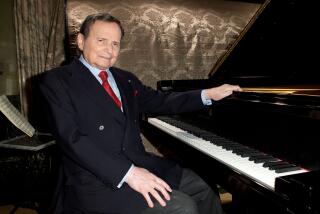PIANIST HOROWITZ GIVES UP ON RETIREMENT--AGAIN
- Share via
NEW YORK — He had vowed never to return. But last year, at 81, Vladimir Horowitz made his first trip back to his Russian homeland in 61 years.
With adoring crowds, tearful relatives and sold-out concerts in Moscow and Leningrad, the trip reinvigorated the pianist.
“He really recharged his batteries,” his friend and manager, Peter Gelb, said. “And the energy has stayed with him.”
So much so that in 1986 alone, Horowitz made a new recording, gave concerts in Frankfurt and Amsterdam, performed at the White House and in December, played at the reopening of Carnegie Hall. During a single week last November, Horowitz’s recordings held the top three spots on the classical music list of Billboard magazine.
Last year also, Horowitz and his wife Wanda Toscanini Horowitz allowed documentary film makers Albert and David Maysles into their home here to make what became “Vladimir Horowitz: The Last Romantic,” scheduled to air in May on PBS.
Lest 1987 seem calm by comparison, Horowitz began the new year by contracting with Summit Books to write his memoirs, a project he says was inspired by his trip to the Soviet Union. As yet untitled, the book will be written in collaboration with Pulitzer Prize-winning writer Harold C. Schonberg, former senior music critic of the New York Times who began reviewing Horowitz’s concerts 35 years ago. Schonberg is the author also of “The Great Pianists.”
Still fueled, apparently, by the momentum that consumed him during the visit to his homeland, Horowitz will travel to Milan next month to prepare a recording with a studio orchestra there--his first orchestral recording in more than 10 years. Later this year he has announced plans for a concert tour of Europe.
Horowitz began playing piano as a boy of 6 in the Ukraine. By age 12, he was enrolled at the Kiev Conservatory of Music. He made his concert debut at age 17, and, armed with a six-month visa to study in Germany, left the Soviet Union in 1925. His U. S. debut, in 1928, was an international news event.
But in 1953, Horowitz retired. Twelve years later he was back at Carnegie Hall for an emotional recital. A second retirement followed in the early 1970s, interrupted again when he performed at a concert in Japan.
That concert went poorly, however. Demoralized, Horowitz once again retreated into retirement.
“He went to pieces,” Gelb said. “He said he would never play again.”
The subject of an unauthorized biography by writer Glenn Paskin, Horowitz decided after the Soviet sojourn that he was ready to tell his own story. Publication of the book in 1988 is scheduled to coincide with Horowitz’s 85th birthday.
More to Read
The biggest entertainment stories
Get our big stories about Hollywood, film, television, music, arts, culture and more right in your inbox as soon as they publish.
You may occasionally receive promotional content from the Los Angeles Times.










